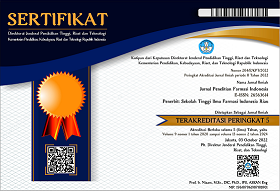POTENSI TANAMAN MANGROVE SEBAGAI AGEN ANTIKANKER: LITERATURE REVIEW
DOI:
https://doi.org/10.51887/jpfi.v10i1.1168Abstract
Cancer is a disease caused by the abnormal growth of body tissue cells that will become cancer cells. Cancer is still one of the world's biggest problems. Cancer causes quite a large number of deaths, in 2018 there were 17 million cases of cancer which caused 9.5 million deaths of the world's population due to cancer. Indonesia is listed as a country that has the richest mangrove species in the world. Mangrove plants have many benefits for health, one of which is as an anticancer. The purpose of writing this literature review is to provide information and an overview of the content of secondary metabolites and bioactive compounds contained in mangrove plants, as well as to determine the potential of mangrove plants as anticancer agents. In the preparation of this literature review, a secondary research method without specific guidelines in writing (non-systematic review) was used, namely the narrative review approach method. This is done by collecting data related to research topics from various electronic and non-electronic libraries. Based on several research results, it is known that mangrove plant extracts have cytotoxic activity against myeloma cancer cells with an IC50 of 508.19 g/mL. The results of the isolation of squalene compounds have an effect as an anticancer in the stomach with potential cytotoxic activity against MCF-7 cancer cells with IC50 values of 644.008 and 595.164μg/mL, respectively. So it's a shame if we don't explore this potential and use it to the fullest for the common good. Many universities and research institutes have explored various plants as sources of medicine but have not looked at the benefits of mangroves.




